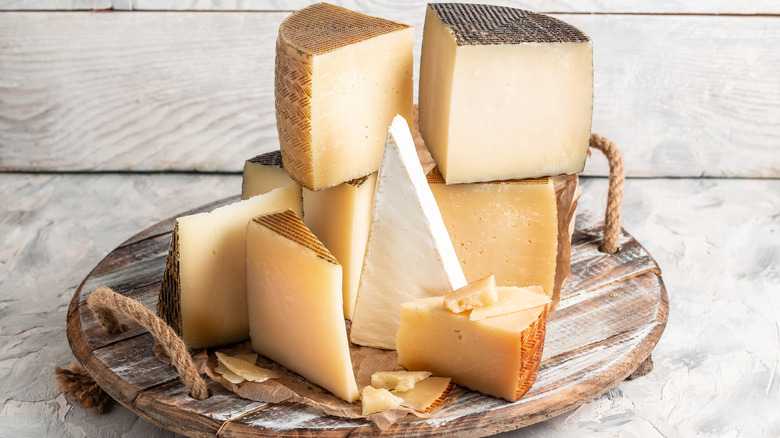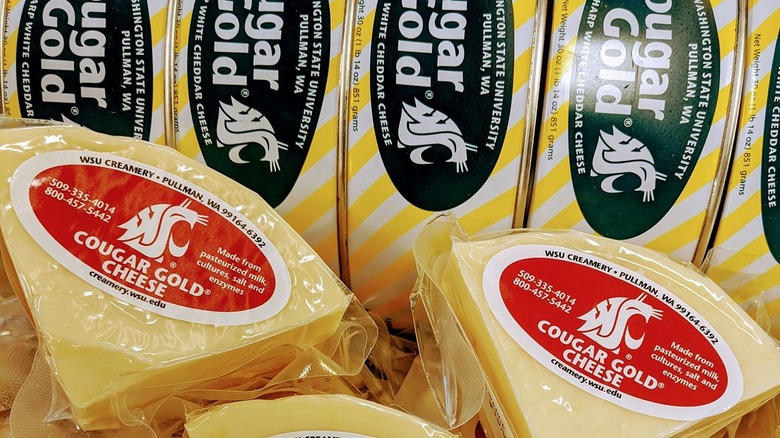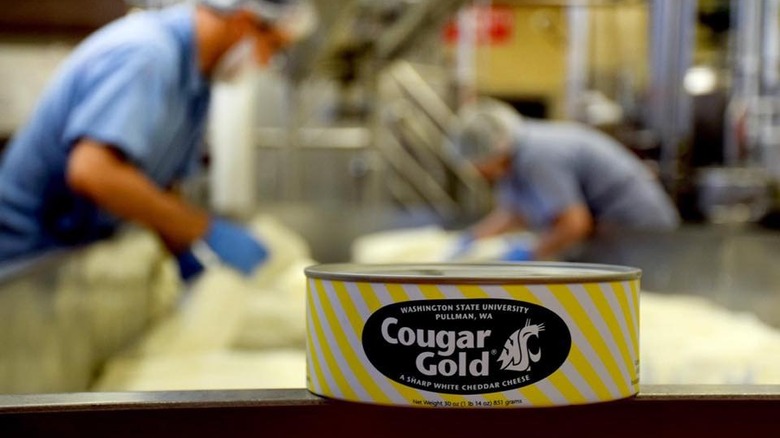Why Washington State University Sells Canned Cheese
Cheese lovers, forget everything you think you know about what makes great cheese. When we want special occasion cheese, most of us head to the fancy cheese counter at our favorite grocery store. We hand-select a range of cheeses, balancing goat's milk, sheep's milk, and cow's milk offerings, along with striving to achieve the ideal variety of textures — some soft, some sharp, some crumbly, some rich and mild. We fret about how long these spendy cheeses will last and carefully let them come up to room temperature before we serve them.
Cheese aficionados would certainly turn their noses up at cheese that comes from a can, right? The image that comes to mind is probably the "squeezy cheese" that we used to squirt from cans as children, inevitably making a mess and even conveying some of the strange stuff to our mouths, discovering that it did, indeed, taste vaguely cheese-like. If you're certain you'd never special order, much less enjoy cheese that comes from a can, you may be about to eat those words.
Washington State University's Cougar Gold cheese in a can is amazing
Washington State University (WSU) operates a creamery as part of its College of Agricultural, Human, and Natural Resource Sciences. That creamery, located in various WSU buildings since the early 1900s, began research in the 1930s, sponsored by the U.S. government and the American Can Company, demonstrating that not only could cheese be successfully stored in cans, but one of the cheeses they made was absolutely delicious.
Dr. N.S. Golding contributed his work and name to the favorite of the cheeses, and Cougar Gold cheese was born. It lives, to this day, in a can, and it's shipped all over the country to cheese lovers in the know. Incidentally, cans were the storage vessel of choice because plastic hadn't yet been invented and wax didn't work because it cracked and cheese became contaminated.
We know Cougar Gold comes in a can, but what does it taste like? Jessica Kelly, writing for Bon Appétit decided she had to try it for herself, and she explains, "At first it looked a little dry and crumbly for my liking. I assumed it would taste very salty and maybe even slightly gritty, a far cry from the smooth, sharp, tangy cheddars I love. I thought wrong. Once I popped a piece in my mouth, it started to melt a bit, creating a creamy, silky texture, with a nice sharpness to it. It was one of the best cheddars I'd ever had."
Turns out, cheese keeps really well in a can
Perhaps the best part about Cougar Gold, is that the can will keep indefinitely in the refrigerator until it's opened, per WSU. The current supply of Cougar Gold cheese that's being shipped for orders is about a year old, and some fans of the cheese have aged their cans for as long as 30 years before opening and enjoying. Cans of Cougar Gold and the other cheeses the WSU Creamery produces may begin to bulge as they age, due to the carbon dioxide that's a natural part of the cheese aging process. WSU recommends opening the can when it begins to bulge as the process won't stop until the pressure is released.
Cougar Gold, the aged white cheddar, is certainly the most popular flavor, but WSU also sells a Natural Cheddar, a Smoky Cheddar with natural smoke flavoring, and Viking, which is a white semi-soft cheese. There are also variations of the Viking cheese, some flavored with dill, another with basil, and with peppers of various heat levels. All the cheeses are shipped in 30-ounce cans, and prices start at $27 plus shipping. Once the cheese in a can arrives, it should be refrigerated, and when it's opened, WSU recommends carving the block of cheese into three or four wedges, wrapping and sealing them up tightly, and they note that Cougar Gold will last as long as other cheddar cheeses, depending on how it's handled.


